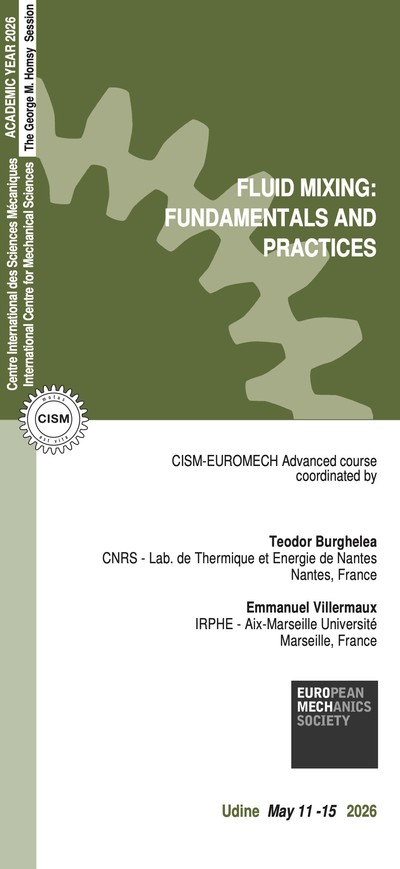M. Ben Amar, A. Goriely (2005) Growth and instability in elastic tissues. J Mech Phys Solids 53:2284-2319.
M. Ben Amar, F. Jia (2013) Anisotropic growth shapes intestinal tissues during embryo-genesis. Proc Nat Acad Sciences (PNAS) 110:10525-10530.
M. Ben Amar (2018) Creases and cracks in finite elasticity. Mech Res Commun, in press.
D. Bigoni (2012) Nonlinear Solid Mechanics - Bifurcation Theory and Material Instability. Cambridge University Press.
M. Carfagna, M. Destrade, A.L. Gower, A. Grillo (2017) Oblique wrinkles. Philos Trans A Math Phys Eng Sci 375 (2017) 20160158.
M. Destrade, I. Lusetti, R. Mangan, T. Sigaeva (2017) Wrinkles in the opening angle method. Int J Solids Struct 122:189-195.
M. Destrade, A. Ni Annaidh, C.D. Coman (2009) Bending instabilities of soft biological tissues. Int J Solids Struct 46:4322-4330.
L. Dorfmann, R.W. Ogden (2010) Nonlinear electroelasticity: incremental equations and stability. Int J Eng Sci 48:1-14.
L. Dorfmann, R.W. Ogden (2014) Instabilities of an electroelastic plate. Int J Eng Sci 77:79-101.
L. Dorfmann, R.W. Ogden (2017) Nonlinear electroelasticity: materials, continuum theory and applications. Proc R Soc A 473:20170311.
Y.B. Fu (2001) Perturbation methods and nonlinear stability analysis. Nonlinear Elasticity: Theory and Applications, Chapter 10. Eds. Y.B. Fu and R.W. Ogden, LMS Lecture Notes Series 283, Cambridge University Press.
6 lectures on: Application of nonlinear mechanics to biological systems. Bifurcations and shapes due to growth. The D’Arcy Thompson hypothesis and conformal mapping. Cracks and creases. Laser ablation as a technique to access stress.
6 lectures on: Brief introduction to solid mechanics, with a view on Cosserat solids and elastoplasticity. Material stability criteria: positive definiteness of the constitutive operator, strong ellipticity, ellipticity and wave propagation. Incremental perturbations to a deformed solid: derivation and use of Green’s functions. Models of shear bands and slip surfaces. Cosserat effects: folding and faulting.
6 lectures on: Derivation of the incremental equations of nonlinear elasticity and the elastic moduli, with a treatment of the cases of material, surface, interface, plate and bending instabilities. The approach will at first be theoretical, with emphasis on the compactness of the formulas derived, in order to arrive at robust formulations for the numerical resolution of boundary value problems.
6 lectures on: Incremental deformations of nonlinear elastic materials. Electroelasticity and the coupled formulation of incremental electroelasticity. Instability and bifurcation of electroelastic materials: general theory and application to particular geometries associated with actuation devices, including wrinkling of thin films with compliant electrodes.
6 lectures on: Methods of nonlinear bifurcation analysis. Localized bulging of inflated rubber tubes, with or without fibre-reinforcement, coupled with new experimental verification of theoretical predictions. Bifurcation and secondary bifurcation in film-substrate bilayers (including creasing). Localized necking in electrodes-coated dielectric plates.
5 lectures on: Application of the general theory to solids with examples of local and global non-uniqueness in the context of nonlinear elasticity and rubberlike materials. Formulation of constitutive laws for materials supporting residual stresses, and the influence of residual stresses in promoting or demoting bifurcation in soft solids.
The registration fee is 600.00 Euro + VAT*, where applicable (bank charges are not included). The registration fee includes a complimentary bag, four fixed menu buffet lunches (on Friday upon request), hot beverages, downloadable lecture notes and wi-fi internet access.
Applicants must apply at least one month before the beginning of the course. Application forms should be sent on-line through the following web site: http://www.cism.it. A message of confirmation will be sent to accepted participants. Applicants requiring assistance with the registration should contact the secretariat at the following email address cism@cism.it.
Applicants may cancel their course registration and receive a full refund by notifying CISM Secretariat in writing (by email to cism@cism.it) no later than two weeks prior to the start of the course.
Cancellation requests received during the two weeks prior to the start of the course will be charged a 50.00 Euro handling fee. Incorrect payments are also subject to a 50.00 Euro handling fee.
A limited number of participants from universities and research centres who are not supported by their own institutions can be offered lodging and/or board, if available, in a reasonably priced hotel or student guest house.
Requests should be sent to CISM Secretariat by April 22, 2020 along with the applicant's curriculum and a letter of recommendation by the head of the department or a supervisor confirming that the institute cannot provide funding. Preference will be given to applicants from countries that sponsor CISM.
Information about travel and accommodation is available on the web site www.cism.it, or can be mailed upon request.
* Italian VAT is 22%.





